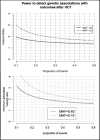Identification and utilization of donor and recipient genetic variants to predict survival after HCT: are we ready for primetime?
- PMID: 25700678
- PMCID: PMC4352187
- DOI: 10.1007/s11899-014-0246-x
Identification and utilization of donor and recipient genetic variants to predict survival after HCT: are we ready for primetime?
Abstract
Overall survival following hematopoietic cell transplantation (HCT) has improved over the past two decades through better patient selection and advances in HLA typing, supportive care, and infection prophylaxis. Nonetheless, mortality rates are still unsatisfactory and transplant-related mortality remains a major cause of death after unrelated allogeneic HCT. Since there are no known pre-HCT, non-HLA biologic predictors of survival following transplant, for over a decade, scientists have been investigating the role of non-HLA germline genetic variation in survival and treatment-related mortality after HCT. Variation in single nucleotide polymorphisms (SNPs) has the potential to impact chemotherapy, radiation, and immune responses, leading to different post-HCT survival outcomes. In this paper, we address the current knowledge of the contribution of genetic variation to survival following HCT and discuss study design and methodology for investigating HCT survival on a genomic scale.
Conflict of interest statement
Dr. Lara E. Sucheston-Campbell, Dr. Alyssa Clay, Dr. Philip L. McCarthy, Dr. Qianqian Zhu, Dr. Leah Preus, Dr. Marcelo Pasquini, Dr. Kenan Onel, and Dr. Theresa Hahn each declare no potential conflicts of interest.
Figures

References
-
- Spellman S, Setterholm M, Maiers M, Noreen H, Oudshoorn M, Fernandez-Vina M, et al. Advances in the selection of HLA-compatible donors: refinements in HLA typing and matching over the first 20 years of the National Marrow Donor Program Registry. Biol Blood Marrow Transplant J Am Soc Blood Marrow Transplant. 2008;14(9 Suppl):37–44. - PubMed
-
- Hahn T, McCarthy PL, Jr, Hassebroek A, Bredeson C, Gajewski JL, Hale GA, et al. Significant improvement in survival after allogeneic hematopoietic cell transplantation during a period of significantly increased use, older recipient age, and use of unrelated donors. J Clin Oncol Off J Am Soc Clin Oncol. 2013;31(19):2437–2449. - PMC - PubMed
-
- Lee SJ, Klein J, Haagenson M, Baxter-Lowe LA, Confer DL, Eapen M, et al. High-resolution donor-recipient HLA matching contributes to the success of unrelated donor marrow transplantation. Blood. 2007;110(13):4576–4583. - PubMed
Publication types
MeSH terms
Substances
Grants and funding
LinkOut - more resources
Full Text Sources
Other Literature Sources
Medical
Research Materials
Miscellaneous

